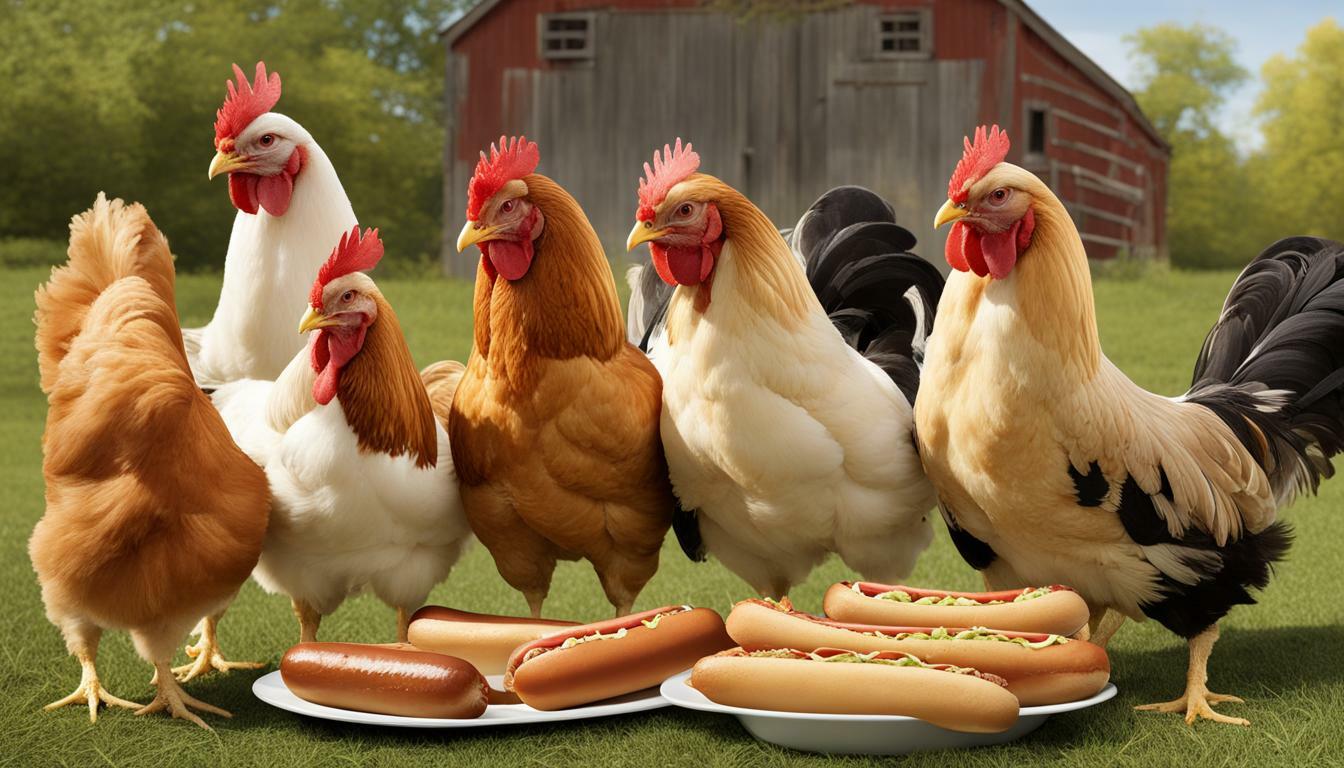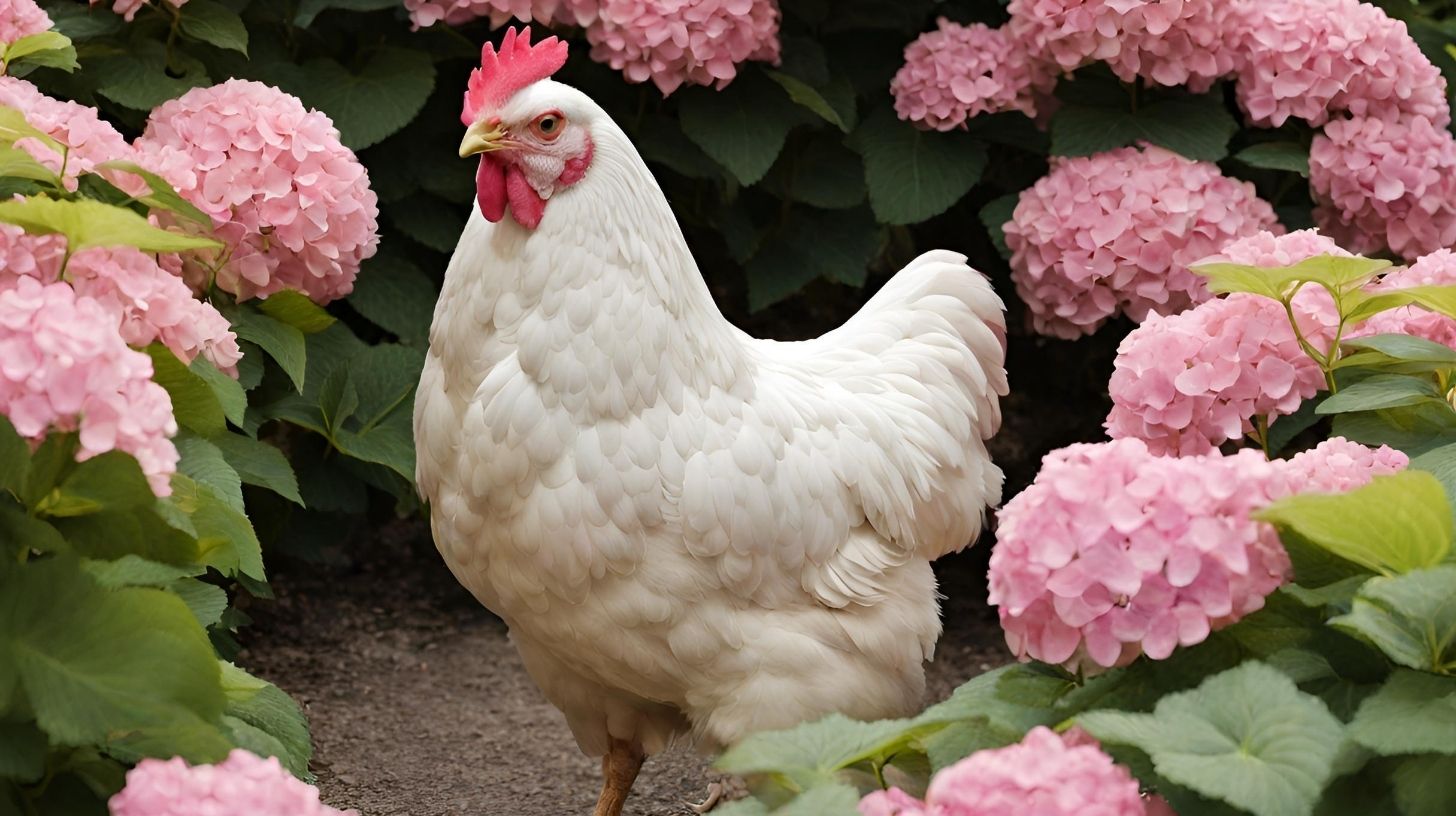Can Chickens Eat Hot Dogs? Find Out the Surprising Answer

Table of content:
Can chickens eat hot dogs? This is a common question for backyard chicken keepers. Hot dogs may seem like a convenient snack to feed your feathered friends. However, hot dogs are not a healthy or recommended treat for chickens.
Should You Feed Chickens Hot Dogs?
Chickens can eat hot dogs, but that does not mean you should make a habit of feeding them. Hot dogs are highly processed and contain many unhealthy ingredients that can cause problems for chickens. There are much better snack options for chickens that offer nutritional value without the risks.
Why Hot Dogs Are Not Good for Chickens
Here are some of the main reasons why hot dogs are bad for chickens:
- High in fat, salt, and preservatives – Hot dogs contain high amounts of fat, sodium, and chemical preservatives like nitrites and nitrates. These are unhealthy for chickens and can lead to obesity and heart issues. The high salt content is particularly hazardous.
- Low in nutrients – Hot dogs provide little nutritional value for chickens. They contain very few vitamins, minerals, or proteins that chickens need in their diet. Feeding hot dogs instead of a balanced diet can lead to nutrient deficiencies.
- Fillers and byproducts – Hot dogs often contain meat byproducts, organ meats, and vegetable or grain fillers. The quality of these ingredients can be questionable and may include animal parts that are unsafe for chickens.
- Choking hazard – Hot dogs can pose a choking risk for chickens due to their shape and consistency. Chickens gulp down food and may not adequately chew hot dogs before swallowing.
- Unnatural additives – Hot dogs contain artificial flavors, colors, and ingredients like corn syrup that are highly processed. These types of additives are difficult for chickens to digest.
Healthier Alternatives to Hot Dogs
Rather than feeding hot dogs, choose healthier treats and foods for your chickens like:
- Chopped hard boiled eggs
- Frozen or thawed peas and corn
- Cooked oatmeal
- Diced tomatoes
- Chopped dark leafy greens
- Mealworms or crickets
- Plain shredded cheese in moderation
- Chopped fruit like berries
These foods provide important vitamins, minerals, antioxidants, and proteins without the unhealthy additives found in hot dogs.
Can Chickens Eat Hot Dog Buns?
What about hot dog buns? Can chickens eat hot dog buns or will these cause issues?
The answer is yes, chickens can eat plain hot dog buns in small amounts as an occasional snack. However, buns should not become a regular part of your chickens’ diet. Here’s why:
- High in carbohydrates – Buns are made from wheat and contain high amounts of carbohydrates and natural sugars. Too many carbohydrates can lead to weight gain and digestive issues in chickens.
- Refined grains – Hot dog buns contain refined wheat flour which has had the nutritious bran and germ removed during processing. Whole grain breads are healthier.
- Preservatives – Hot dog buns often contain preservatives to extend shelf life. These chemical additives are unhealthy. Check labels and choose preservative-free buns.
- Choking risk – As with hot dogs, the soft, airy texture of buns poses a choking hazard for chickens. Always supervise chickens when feeding buns.
- Limited nutrients – While not as nutrient-poor as hot dogs, buns still only provide chickens with carbohydrates and some B vitamins. They lack protein, fat, vitamins,and minerals chickens need.
Overall, a few small pieces of plain hot dog bun on occasion will not harm chickens. But buns should never become a dietary staple. For the healthiest diet, feed chickens a balanced feed and use nutritious whole food snacks.
Are Hot Dogs Toxic to Chickens?
Hot dogs are not directly toxic to chickens, but they do contain some ingredients that can be harmful. Specifically, the nitrates and nitrites in hot dogs could potentially cause problems for chickens over time.
Nitrates and nitrites are preservatives commonly added to processed meats like hot dogs and sausage. In large quantities, nitrates/nitrites can cause:
- Damage to red blood cells
- Lowered egg production
- Thyroid issues
- Vitamin E deficiency
Very high nitrate/nitrite levels can be fatal. However, the amounts found in most commercial hot dogs are unlikely to poison chickens with one feeding.
Still, it’s best to avoid feeding hot dogs frequently so chickens don’t ingest unhealthy levels of these preservatives over time. Also opt for nitrate/nitrite-free hot dog brands when possible.
Along with nitrates/nitrites, other hot dog ingredients like excess fat, salt, and sugar can detrimentally affect chickens’ health. But in moderation, a occasional hot dog won’t typically be toxic.
Can Chickens Eat Sausage, Pepperoni, or Salami?
Chickens can eat small amounts of sausage, pepperoni or salami on occasion. But these processed, preserved meats pose the same risks and dangers as hot dogs.
Sausage, pepperoni, and salami contain:
- High sodium levels
- Nitrates and nitrites
- Filler ingredients
- Fatty meat trimmings
- Various preservatives
Feeding these regularly or in large quantities may cause obesity, gastrointestinal issues, or other health problems in chickens. Stick to lean cuts of fresh meat as healthier, more natural protein sources.
Also, be aware that much like hot dogs, the cylindrical shape and soft texture of these meats could cause choking. Always supervise chickens when feeding any processed or extruded meat products.
Can Chickens Eat Hot Dog Condiments?
What about hot dog toppings like relish, mustard, or ketchup? Here’s whether these condiments are safe for chickens:
- Relish – Contains lots of salt and sugar. Feed only tiny portions infrequently.
- Mustard – Spicy mustard can upset chickens’ stomachs. Mild mustard is safer but high in salt.
- Ketchup – Some sugar and salt, but small occasional portions are fine. Offers beneficial lycopene from tomatoes.
- Onions/Garlic – Contains healthy prebiotics but can cause anemia in excess. Use sparingly.
- Pickles – Avoid feeding. High in sodium, and acidic brine isn’t good for chickens.
Overall, it’s best to avoid giving chickens hot dog condiments regularly or in large amounts. Tiny tastes are fine for variety, but can cause health issues if chickens fill up on these salty, sugary foods. Offer fresh veggies instead for a healthy crunch!
Are Hot Dogs Safe for Chickens Raw or Cooked?
Can chickens eat raw hot dogs or are they only safe cooked? Here are some tips:
- For safety, always cook hot dogs fully before feeding to chickens. Raw or under cooked hot dogs may contain harmful bacteria like salmonella. Cook to 165°F for safety.
- Avoid under cooked hot dog centers which can pose a choking risk. Fully cooked hot dogs are soft and easy to swallow.
- Don’t feed uncooked hot dog batter or meat mixtures. Raw pork or beef could contain parasites. Only feed fully cooked hot dog products.
- Check for recalled brands linked to contamination. Raw meats like hot dogs are sometimes recalled for disease risks. Cooking eliminates these hazards.
The bottom line is that only fully cooked hot dogs are safe for chickens to eat on occasion. For best practice, cook all hot dogs thoroughly before feeding. Monitor your flock closely and discontinue feeding if any signs of illness develop.
What About Chicken Hot Dogs?
You may see “chicken” hot dogs marketed for pets or humans. But are these a healthier choice for chickens given the chicken meat content?
Unfortunately, chicken hot dogs are unlikely to be any better than pork/beef hot dogs for chickens. Here’s why:
- Still highly processed – Manufacturing methods are the same regardless of meat type. Lots of additives are still used.
- Contains other meats – Chicken hot dogs usually mix poultry with other meat byproducts. Chicken may not be the main ingredient.
- High sodium/fat – Chicken dogs aren’t typically lower in salt, fat, or calories versus beef or pork dogs.
- Fillers used – Many of the same fillers like corn, rice, and grains are used in chicken hot dogs.
- Same preservatives – Nitrites/nitrates are still added even in chicken hot dog varieties.
Given the equally processed nature of chicken hot dogs, they offer no health advantages over other types. You’re better off feeding real, unprocessed chicken meat like cooked chicken breast or thigh.
Are Hot Dogs Ever OK for Chickens?
Based on all the health drawbacks, should you avoid feeding hot dogs to chickens entirely?
While hot dogs should never be a regular part of your chickens’ diet, an occasional small portion of plain hot dog is unlikely to harm healthy chickens.
If you do decide to feed a hot dog treat, follow these tips:
- Feed only once in awhile, not daily or even weekly
- Choose uncured, preservative-free, low-sodium varieties
- Limit to a small portion of one plain hot dog cut in strips
- Always cook thoroughly before feeding
- Supervise while chickens are eating
- Observe for signs of illness afterward
With just the occasional cooked plain hot dog in a small amount, your chickens can likely enjoy it as a snack without issues. But for their healthiest diet, stick to nutritious whole foods.
Final Thoughts
Can chickens eat hot dogs? In very small, infrequent amounts, a plain hot dog won’t necessarily harm chickens. But on the whole, hot dogs contain many unhealthy ingredients and offer little nutritional value. There are far better, more nutritious snack alternatives for chickens.
While the occasional tiny taste of a hot dog is unlikely to be toxic, these high-fat, high-sodium, processed meats have no place as a regular part of your flock’s diet. For optimal nutrition and health, offer chickens a balanced feed and healthy whole food snacks instead. Keep hot dogs reserved for very rare special treats if you choose to share them at all.
Welcome. I’m Adreena Shanum, the proud owner of this website, and I am incredibly passionate about animals, especially poultry. I founded adreenapets.com as a labor of love, stemming from my desire to share my knowledge and experiences with poultry enthusiasts worldwide.




